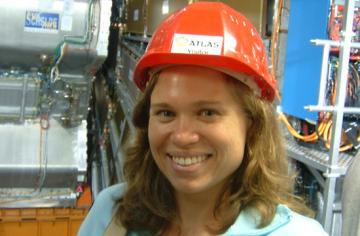PhD grad contributes to ATLAS particle detector
- Melanie Tromp Hoover

Lorraine Courneyea, who graduates this month with her PhD in high-energy physics, just completed the kind of program that every particle-physicist-in-the-making dreams of.
Nestled between snowy Alps and delicious cheeses, Courneyea was set to spend one year of her program on the ground in Geneva working with data from the Large Hadron Collider (LHC), the world’s largest particle accelerator, during the lead-up to and launch of what was supposed to be a series of record-breaking particle collisions—the highest energy collisions ever produced—in fall 2008.
This international placement—part of the package for PhD students working with UVic’s ATLAS (particle detector experiment) group—shifted slightly in scope from analysis to a lengthy prep session for Courneyea when the LHC was halted due to a serious electrical fault that caused a rupture in the equipment, setting the collection of data at these energies back by months.
But it was this extra year of groundwork that made Courneyea an expert and eventual team leader in her contribution to the ATLAS experiment: she ended up chairing an international team working to ensure the electronics for the liquid argon calorimeters—key components of the detector—were properly calibrated.
When all systems were finally ready to go in March 2010, she and her team were well prepared. “You couldn’t move, the ATLAS control room was so packed,” she recalls.
Courneyea eventually became a shift leader in this room, coordinating each of the procedures necessary for the ATLAS experiment to signal that it was ready for collisions.
“There is, in fact, a big red button behind a glass panel in case of an emergency stop,” she laughs. “But the idea that everyone is in lab coats is a total myth.”
The LHC was built at the European Organization for Nuclear Research (CERN) to test physics predictions by more than 10,000 scientists and engineers, including Courneyea’s UVic supervisors Dr. Richard Keeler and Dr. Robert McPherson (physics and astronomy).
The Toronto native credits both supervisors and a great group of fellow Canadian graduate students and post-doctoral fellows for making her Geneva experience the highlight of her career so far.
“The LHC is the biggest science project of all time; who could possibly pass up the opportunity to work at CERN?”
With this huge project and a PhD behind her, Courneyea is now looking at her options outside of academia, particularly as they relate to science policy work for the federal government.

